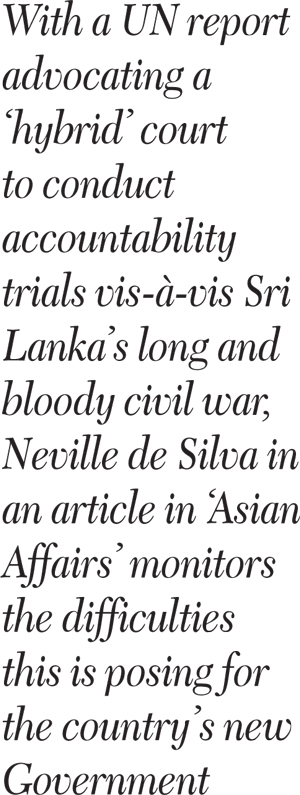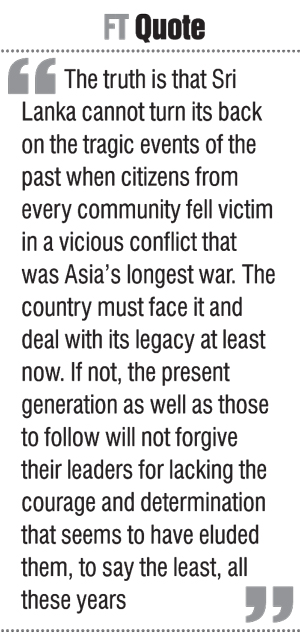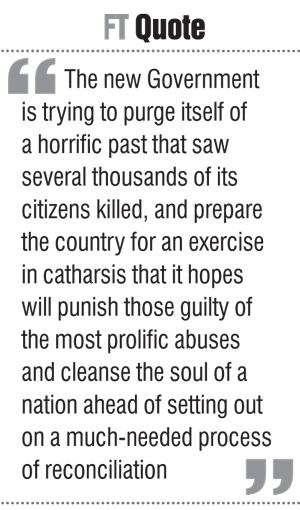Wednesday Mar 04, 2026
Wednesday Mar 04, 2026
Saturday, 14 November 2015 00:00 - - {{hitsCtrl.values.hits}}

The Lessons Learnt and Reconciliation Commission was mandated to (among other aims) promote national unity and reconciliation among all communities
 Asianaffairs.in: ‘What’s in a name?’ Shakespeare famously queried, adding that ‘a rose by any other name would smell as sweet’. That might well be true. But in the minefield of diplomacy and international negotiation, nomenclature is no attar of roses.
Asianaffairs.in: ‘What’s in a name?’ Shakespeare famously queried, adding that ‘a rose by any other name would smell as sweet’. That might well be true. But in the minefield of diplomacy and international negotiation, nomenclature is no attar of roses.
This the new Sri Lanka Government is increasingly discovering as it tries to squeeze itself out of a tight corner following September’s 30th session of the UN Human Rights Council in Geneva, which had before it a Council-mandated report on Sri Lanka alleging human rights violations and other abuses supposedly committed by both warring parties in the three-decade-long armed conflict that ended six years ago.
At the heart of the problem confronting the National Unity Government (NUG), formed after the August Parliamentary elections that saw the defeat of the faction led by the former President Mahinda Rajapaksa, is a core recommendation of the Office of the High Commissioner for Human Rights (OHCHR) which investigated the alleged human rights abuses.
The new Government is trying to purge itself of a horrific past that saw several thousands of its citizens killed, and prepare the country for an exercise in catharsis that it hopes will punish those guilty of the most prolific abuses and cleanse the soul of a nation ahead of setting out on a much-needed process of reconciliation.
‘Hybrid’ court
The most troubling recommendation was the call to set up a ‘hybrid’ court to conduct accountability trials against those accused of violating human rights during the nine years starting 2002, the exact period covered by Sri Lanka’s own Lessons Learnt and Reconciliation Commission (LLRC).
But the emphasis in the UN report is more on the last stages of the war, which resulted in the military decimation of the Liberation Tigers of Tamil Eelam (LTTE), the minority Tamil insurgent forces, in May 2009 when the Mahinda Rajapaksa presidency held sway.
The recommended hybrid court would have international participation. Foreign judges, prosecutors, lawyers and investigators were to be an intrinsic part of the judicial mechanism that was to be set up for this purpose.
The report of the High Commissioner is the result of the 2014 US-led resolution adopted in Geneva, calling for an independent investigation into the alleged abuses that was backed by less than half of the 47-member Council. Two permanent members of the UN Security Council, China and Russia, and a potential member, India, did not support the resolution.
No sooner had High Commissioner Zeid al-Hussein’s report reached the public domain than opposition erupted to it in Sri Lanka and among sections of the Sri Lankan community abroad, who saw the recommendations as intrusive and an attempt to undermine the country’s sovereignty and its judicial system by condemning its justice process and infiltrating it with foreign components.
Others saw it as not going far enough to address the grievances of the Tamil people, believing that only an international independent investigation can bring justice.
The sticking point was that in the run-up to the presidential election in January this year, and in his election manifesto, Maithripala Sirisena had held out that in the event of winning the presidency he would address issues of accountability through national independent judicial mechanisms, the Foreign Minister Mangala Samaraweera was to remind the UNHRC addressing the sessions.
Sirisena made that promise in anticipation of what was seen as a probable outcome of the investigation conducted by al-Hussein’s office. The President said that he would not permit Sri Lankans to be dragged before international tribunals on charges of committing war crimes.
There is no gainsaying that hauling senior commanders of the armed forces – considered heroes by a substantial segment of the Sri Lankan people for their role in defeating a vicious and ruthless enemy like the Tamil Tigers – before a court consisting of international judges and prosecutors would find little popular appeal in the country.
The realisation that any attempt to internationalise the judicial process would have a negative impact on the country’s sovereignty and on his own presidency made Sirisena determined to ensure a domestic mechanism as the way forward for any judicial accountability investigation and prosecution of the possible perpetrators.
Yet he was acutely conscious of the fact that he must go beyond accountability and move towards reconciliation with the Tamil minority, in particular if he is to build a united nation.
New vision for Sri Lanka
Addressing the UN General Assembly sessions in New York while the Sri Lanka report was still being discussed in Geneva, President Sirisena said the new vision for Sri Lanka ‘involves achieving the twin objectives of development and reconciliation. A fundamental requirement in this context is dealing with the past honestly and building a modern Sri Lankan nation. In dealing with the past, we will follow a process of truth seeking, justice, reparation and non-recurrence’.
Earlier in an interview with The Hindu newspaper, Prime Minister Ranil Wickremesinghe said that only a domestic mechanism ‘which would function within the four-corners of our constitution but also be acceptable to all communities in Sri Lanka plus the international community’ would be established to investigate the human rights allegations during the final phase of the war.
Wickremesinghe, who in a previous stint as Prime Minister had refused to sign the Statute of Rome, said Sri Lanka is not a signatory to that statute. “There is no legal basis for an international investigation within Sri Lanka.”
As President, Sirisena’s predecessor Mahinda Rajapaksa failed to take concrete steps to probe the numerous allegations of human rights abuses and other violations of international law and clear the ground for reconciliation. He is accused of ignoring the pledges he gave to UN Secretary-General Ban Ki Moon during the UN leader’s visit to Sri Lanka shortly after the defeat of the Tamil Tigers.
The new Government has claimed that it is Rajapaksa’s failure to have these allegations investigated and to deal with the offenders that led to the UNHRC adopting a resolution calling for an independent investigation into the purported abuses of international law.
It is true that last month’s US-led resolution made no reference to a hybrid court as urged by al-Hussein and supported by hard-line Tamil elements in Sri Lanka, sections of the worldwide Tamil diaspora and some international human rights groups.
What’s in a name, after all?
But what’s in a name, after all? The US draft resolution might not have called it a hybrid court but it had all the makings of it. As I wrote in the October issue of Asian Affairs, the original draft resolution, while appreciating Sri Lanka’s proposal to establish a judicial mechanism and affirming that credible transitional justice should include independent judicial and prosecutorial institutions led by persons known for their integrity and impartiality, called upon the Sri Lanka Government to involve international investigators, prosecutors and judges in Sri Lanka’s justice processes.
The wellspring for that insistence upon international participation in the whole judicial process pertaining to investigations into probable war crimes and their prosecution is surely the Sri Lanka report by the High Commissioner’s office.
The Sri Lankan Government was taken aback by the draft and the emphasis it placed on international participation. In the light of the apparent assurances given by the US Assistant Secretary of State for South Asia, Nisha Biswal, during her visit to Colombo before the Geneva meeting, it was thought that the tone and substance of the resolution would be more agreeable.
Biswal said that the US does not want to upset the apple cart by presenting a strong anti-Sri Lanka resolution, warning that a strong resolution accusing Sri Lanka of committing war crimes will be exploited by ultra-nationalist forces opposed to accommodation with the Tamils.
She said the new resolution will be a “resolution of collaboration with the Government of Sri Lanka and other key stakeholders,” words that indicated a perceptive shift in Washington’s stance after it had said it supports an independent domestic probe.
If the US was able to say in advance that it would be a “resolution of collaboration,” the conclusion some have drawn is that it has already been discussed with Colombo and some kind of accommodation reached.
If that conclusion is correct, then was the tough resolution on the table that presumably took Colombo by surprise simply a ploy to satisfy those who were demanding their pound of flesh following the al-Hussein report and a way out for Sri Lanka with its critics snapping at its heels?
It would give Sri Lanka an opportunity to raise strong objections and eventually have the terms of the resolution toned down, thus giving the impression of a successful diplomatic drive by Colombo, enhancing the reputation of the Sirisena-Wickremesinghe administration as not succumbing to Western pressure.
Watering down the resolution
The 2,600-word resolution contained 26 operative paragraphs. Sri Lanka took objection to 14 of them, calling for changes. The media suggested that there was frenetic diplomatic activity between Colombo, Washington and Sri Lanka’s delegation in Geneva to ‘water down’ the resolution.
Whether other member-states were approached by Colombo has not been publicly declared but the grapevine suggests that India was one of those countries. After the meeting between President Sirisena and Prime Minister Modi in New York, where they met at the UN General Assembly, the Indian External Affairs Ministry’s spokesman Vikas Swarup said that as far as India is concerned, ‘we naturally support the quest for justice. At the same time we are respectful of Sri Lanka’s sovereignty. We are hopeful that a way will be found where both these points and objectives can be met’.
The Sri Lanka Government claims it managed to have the resolution toned down, especially with regard to a ‘hybrid’ court-a word the resolution avoided using even in the draft, although it introduced it by other means.
The Government’s harshest critics say this was nothing but a charade to show the domestic audience that its diplomacy had triumphed and it was successful in wearing down the US, though some of the core advocates of the resolution were keen to see a stronger verdict.
But what did the final resolution, co-sponsored by Sri Lanka and put to the council, say in the vital operative paragraph 6? Having referred to a credible justice process which should include independent judicial and prosecutorial institutions and impartial persons of integrity, it concluded: ‘…and also affirms in this regard the importance of participation in the Sri Lanka judicial mechanism, including the Special Counsel’s office of Commonwealth and other foreign judges, defence lawyers and authorised prosecutors and investigators’.
Perhaps legal experts might find a significant difference between the wording in the original draft and the final one that Sri Lanka co-sponsored, but to the average reader the only difference appears to be that the word ‘international’ has been replaced by ‘Commonwealth and other foreign judges’.
Maybe it was felt that the Commonwealth, of which Sri Lanka has been a longstanding member and with which Sri Lankans are more familiar, will provide a more agreeable resonance than ‘international’, which people here have come to associate with aggressive and anti-Sri Lankan Western powers.
Yet is there any significant difference between ‘international’ judges and ‘other foreign judges’? Are foreign judges not international or international judges not foreign?
Dayan Jayatilleke, a former Ambassador to Geneva who saw off a UN-sponsored anti-Sri Lankan resolution in 2009, argues that the core and essence of the original US draft remains and what Sri Lanka has managed to do is to water-down inessentials. He claims that what has been agreed to is not a Sri Lankan judicial mechanism but the infamous hybrid.
Another former Sri Lankan Ambassador to Geneva, Tamara Kunanayagam, argues that “country-specific resolutions are a soft-power weapon to promote the strategic interests of its author, not anybody’s human rights”. The Sri Lanka resolution is indeed country-specific and a development that India has been concerned about as creating a precedent which could be used against other countries in the future.
“Having agreed in Geneva to establish what international lawyers would unhesitatingly term a blueprint for some form of hybrid court, the Government’s posturing at home has been inconsistent and woefully short-sighted. Its continuous assertions that the international component in the resolution only involves technical advice and assistance and not participation in trials fly in the face of the clear text of the resolution. The Government is entitled to call the proposed court whatever it wants and may choose not to term the court ‘hybrid’ – even the agreement to establish a UN-administered hybrid court in Cambodia described the envisaged court as one that would be ‘within the existing court structure of Cambodia’ – but it must not seek to mislead its own constituency on the nature of the international participation in trials to which it has assented. There are promising signs of the government seeking broad civil society support to create space in the broader Sinhala-speaking public within which the resolution could become acceptable, but even these efforts are plagued by a fudging of the international participation question,” wrote analyst Niran Anketell in an article headlined Geneva Resolution and Politics: A Note of Caution in the Colombo-based Groundviews, a citizen’s journalism website.
In a letter to the All Party Parliamentary Group for Tamils, the UK Minister of State at the Foreign and Commonwealth office, Hugo Swire, said the British Government has affirmed the need for foreign judges in Sri Lanka’s domestic accountability process to ensure its credibility.
“The resolution adopted recently at the UN Human Rights Council (UNHRC) notes the importance of the participation of Commonwealth and other foreign judges and defence lawyers in Sri Lanka’s judicial accountability process,” he wrote, adding that the ball is now firmly in Sri Lanka’s court and the UK wants Sri Lanka to credibly implement the commitments it has signed up to and to take forward the recommendations in the OHCHR report.
Foreign participation
By whatever term is used for the justice process that is to be set up to inquire into and determine accountability, the fact is that there will be foreign participation at various levels.
The vital question is who will determine the composition of the court, how many foreign judges there will be, along with prosecutors and others, and whether Sri Lanka will have control over the process or will have to share responsibility with foreign bodies.
Sri Lanka has also accepted other obligations such as repealing or amending domestic law relating to several areas, including terrorism and public security.
It has been argued by supporters of the Sri Lanka Government’s stand that had it not cooperated with the US and core members of the resolution and adopted a confrontationist stance, it might have led to the imposition of sanctions against the country by the West. The US and the European Union are the country’s biggest markets and any economic sanctions would have been a crippling blow.
Others argue that confronting the Western sponsors of the resolution could indeed have angered them in the light of the al-Hussein’s report and may have resulted in various impositions, but wonder whether it was prudent for the Sri Lanka Government to co-sponsor a resolution that places onerous responsibilities on the country.
The debate on this will continue not only in Parliament, where legislation will need to be introduced with regard to the special court and related issues, but it will surely spill over into the public sphere and the media, which is already having a field day.
The Rajapaksa faction reeling under numerous investigations by law enforcement agencies scrutinising purposed abuses by the Rajapaksa family and its inner circle could find this an unexpected casus belli. Already some of the minor left-oriented parties are planning countrywide rallies to supposedly acquaint the public on the dangers confronting the country, particularly the dangers facing Sri Lanka’s ‘war heroes’.
However, the truth is that Sri Lanka cannot turn its back on the tragic events of the past when citizens from every community fell victim in a vicious conflict that was Asia’s longest war.
The country must face it and deal with its legacy at least now. If not, the present generation as well as those to follow will not forgive their leaders for lacking the courage and determination that seems to have eluded them, to say the least, all these years.
(Source: http://asianaffairs.in/november2015/sri-lanka.php)